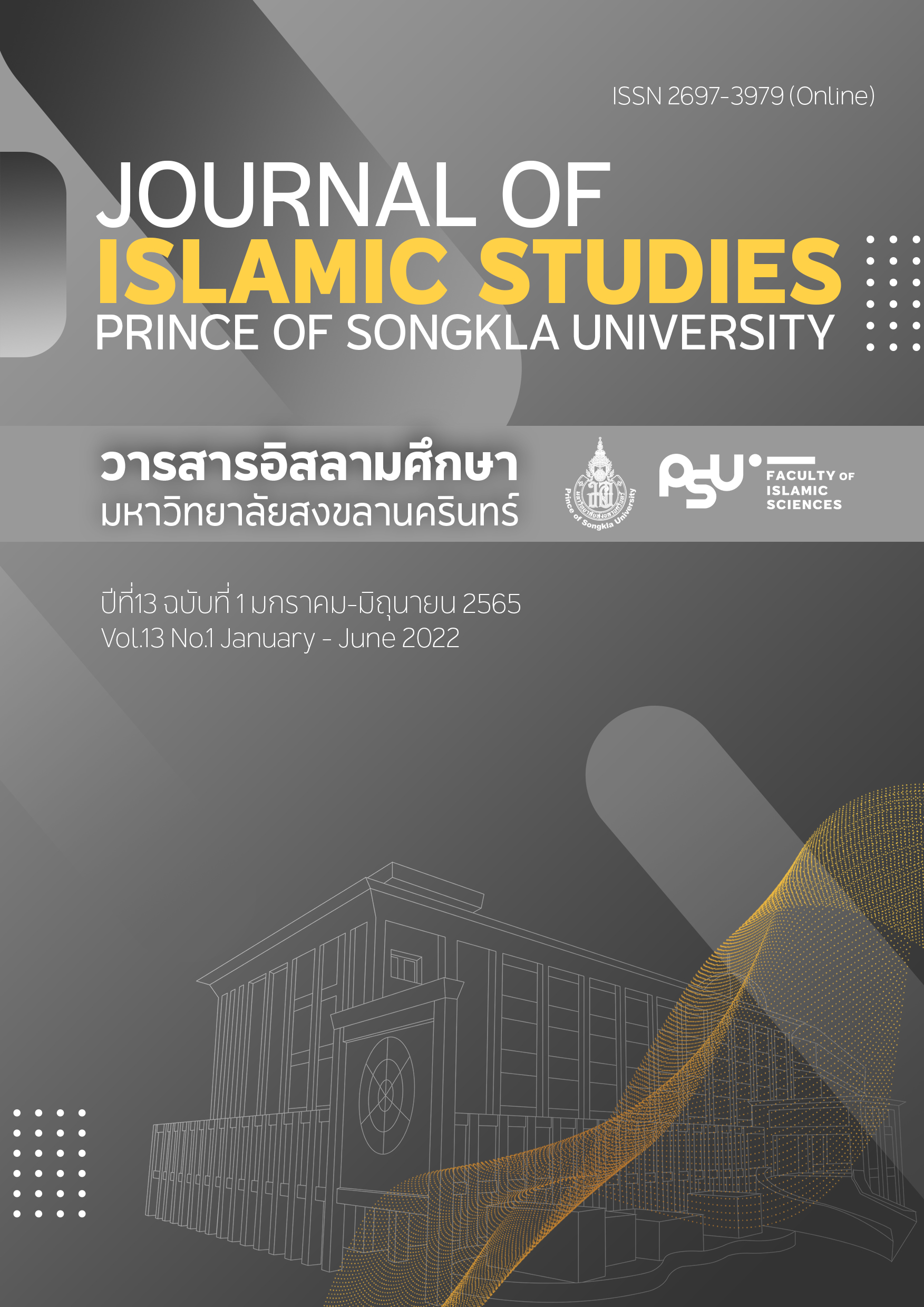International Relations and Islamic perspective
Keywords:
International Relations, Islamic Perspective, War and PeaceAbstract
Objective 1) To present international relations (IR) from the Islamic perspective; 2) To develop an understanding and explanation of the peaceful co-living between Muslims and non-Muslims in plural societies and states.
Methodology This study employs a qualitative approach by collecting and analyzing the secondary sources based on the interpretations of Islamic jurists (fuqaha) alongside Islamic history and the contemporary world.
Research Findings The study finds that international relations in the understandings of Islamic jurists connotes the relations among humans, which covers Muslims and non-Muslims. In Islamic history, Madinah was the model of managing relations among states through wars and treaties. According to the Islamic jurists, three categories of relations were: the territory of Islam (Dar al Islam), the territory of war (Dar al-Harb), and the territory of the treaty (Dar al-Sulh). Given the contemporary global issues in which Islam and Muslims have become significant actors linked with terrorism and threats to global peace, the explanation of the Jihad concept, in terms of interpretation and practice, is relevant.
Contributions This will be an academic reference for teaching and learning in politics and international relations, which has been highly influenced by the studies of interactions among the European states and society but limited in the analyses of Islamic history and contemporary global Muslim politics.
References
Abdou Selim, A. (2015). The Concept of Coexistence in Islamic Primary Sources: An Analytical Examination. Cambridge Scholars Publishing.
Abo-Kazleh, M. (2006). Rethinking International Relations Theory in Islam: Toward a More Adequate Approach. Alternatives: Turkish Journal of International Relations, 5(4), 41-56.
Abu Zahra, M. (2006). kotkēn ʻItsalām nai kāntham songkhrām. [The Islamic Rules of War]. 2nd ed. Saisamphan.
AbuSulayman, A. (1993). Towards an Islamic Theory of International Relations: New Directions for Methodology and Thought, (2nd ed.). The International Institute of Islamic Thought.
Al-Shanqette, M. A. (2009). ʻItsalām sātsanā thī sombūn. [Islam: The Perfectly Complete Religion]. 2nd ed. Natcha Printing.
Al-Zuhili, W. (2005). Islam and International Law. International Review of the Red Cross. 87(858), 269-283. Retrieved from https://internationalreview.icrc.org/sites/default/files/irrc_858-3.pdf
An-Naim, A. (1987). Islamic Law, International Relations, and Human Rights: Challenge and Response. Cornell International Law Journal, 20(2). 317-335.
Chai-aksornvej, A. (2006). ʻumma nai thāna Cosmopolitanism : khwāmpen nư̄a dīaokan rư̄ khwām lāilāk. [Ummah as Cosmopolitanism: Homogeneity or Heterogeneity. An article presented in the National Graduate Research Conference on Transnationalism, Faculty of Political Science, Thammasat University. 30 November 2006.
As-Sibaa'ie, M. (2010). thammai lōk čhưng tō̜ng lư̄ak ʻItsalām. [Civilization of Faith: A Journey though Islamic History]. Translated by Ahman Sona. Thammasat University Press.
Baroudi, S. E. (2018). Sheikh Muhammad Abu Zahra (1898–1974) on International Relations: The Discourse of a Contemporary Mainstream Islamist. Middle Eastern Studies, 54(3), 415-441.
Bsoul, L. A. (2007). Theory of International Relations in Islam. Digest of Middle East Studies. 16 (2), 71-91. Retrieved from https://onlinelibrary.wiley.com/doi/pdf/10.1111/j.1949-3606.2007.tb00127.x
Fuller, G. (2008). The World without Islam. Foreign Policy 164, (46-53).
Hassan, M. (2007). War, Peace or Neutrality: An Overview of Islamic Polity’s Basis of Inter-State Relations, Working Paper No. 130 S. Rajaratnam School of International Studies Singapore. Retrieved from www.rsis.edu.sg/wp-content/uploads/rsis-pubs/WP130.pdf
International Union of Muslim Scholars. (n.d.). A Fatwa concerning the term “dar al silm wa al-Islam” as Inclusive of Dagestan and Similar Countries. Retrieved from http://iumsonline.org/portal/en-US/conferences-seminars/34/c/a-fatwa-on-%E2%80%9Cdar-al-islam%E2%80%9D-as-inclusive-of-dagestan/5836/
Ali, I. (2009). Usul al-Fiqh. 2nd ed. Mittrabharp.
Chapakiya, I. L. (2015). Weekly Islamic Quranic Commentary: Tafsir Surah Al-Furqan. Majils Ilmi Bra-o, Pattani. 13 July 2015.
Khadduri, M. (1955). War and Peace in the Law of Islam. The Johns Hopkins Press.
Lerman, E. (1981). Mawdudi’s Concept of Islam. Middle East Studies, 17 (4). 492-509. Retrieved from http://www.jstor.org/stable/4282856
Mandaville, P. G. (2001). Transnational Muslim politics: Reimagining the umma. Routledge.
Moten, A. R. (1996). Political Science: An Islamic Perspective. Macmillan Press Ltd.
Piscatori, J. (n.d.). International Relations and Diplomacy. In The Oxford Encyclopedia of the Islamic World. Oxford Islamic Studies Online 1. Retrieved from http://www.oxfordislamicstudies.com/article/opr/t236/e0375
Qutb, S. (1981). lakchai ʻItsalām. [Milestones]. Translated by Bharadon. Thai Muslim Students Association.
Qutb, S. (1984). ʻItsalām læ santiphāp sākon. [Islam and Universal Peace]. Translated by Bharadon. Thai Muslim Students Association.
Sheikh, F. (2016). Islam and international relations: Exploring community and the limits of universalism. Rowman & Littlefield.
Sylla, M. L., Ach-chareef, A., & Chapakiya, P. (2021). One of the Best Way for Peaceful Coexistence: Islamic Etiquette. Journal of Islamic Studies, Prince of Songkla University, 12 (2), 133–144. Retrieved from https://so03.tci-thaijo.org/index.php/ JOIS/article/view/255387
Downloads
Published
How to Cite
Issue
Section
License
Copyright (c) 2022 Journal of Islamic Studies, Prince of Songkla University

This work is licensed under a Creative Commons Attribution 4.0 International License.
All articles Published in The Journal of Islamic Studies are author’s opinions, and not the responsibility of the Faculty of Islamic Sciences nor the editorial board. However any citation should be referred to the journal.
















